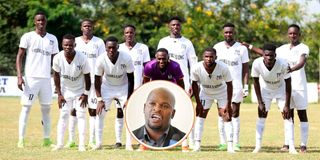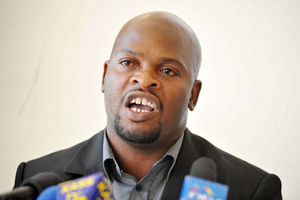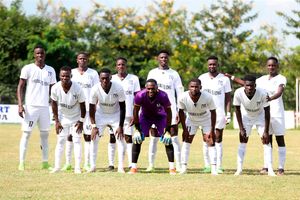
Muhoroni Youth FC players pose for a team photo before the FKF Premier League match against Gor Mahia at St Sebastian Park, in Muranga County on May 5, 2024. Inset: Club chairman Moses Adagala.
The biblical analogy summarizes it all: “What you have spoken in the dark will be heard in the daylight, and what you have whispered in the inner rooms will be proclaimed from the housetops.”
This verse has found relevance in Kenyan football once again, as fresh revelations of match-fixing rock the local scene, this time involving Kisumu-based Muhoroni Youth.
On May 2, world football governing body Fifa ordered the relegation of Muhoroni Youth from the second-tier National Super League (NSL) to the third-tier Division One League after the club was found guilty of manipulating match results.
The ruling, announced by Fifa’s Disciplinary Committee, reads:
“Kenyan club Muhoroni Youth have been found guilty of activities related to the manipulation of football matches and competitions, and the club’s senior team have consequently been expelled from the Football Kenya Federation National Super League. The Fifa Disciplinary Committee has further ordered the relegation of the Muhoroni Youth senior team to the Football Kenya Federation Division One League ahead of next season.”
This case is the latest in a string of match-fixing scandals in Kenyan football.
Last month, Harambee Stars goalkeeper Patrick Matasi was caught up in a match manipulation controversy after a video emerged showing him allegedly discussing plans to fix an upcoming game.
In May last year, three referees, Meshack Omondi, Jacqueline Barongo and Stephen Adeya, together with Talanta FC goalkeeper Kevin Olango and Kibra United team manager Abdulkarim Amele were suspended by FKF over suspected match-fixing during a Premier League match between Talanta and Nairobi City Stars.
In 2020, Fifa banned former Kakamega Homeboyz player George Mandela for life over match-fixing. His teammates Moses Chikati, Festus Okiring, and Festo Omukoto were handed four-year bans.
Muhoroni Youth’s fall from grace has been coming.
In 2016, Muhoroni Youth made history by winning their first national trophy, five years after gaining promotion into Kenya’s top-flight league.
The Kisumu-based side, shocked record Football Kenya Federation Premier League (FKF-PL) champions Gor Mahia FC 1-0, in a chaotic Top Eight final that ended prematurely at Nyayo National Stadium.
Gor Mahia fans became unruly and disrupted the match after it became apparent that their team would lose the match and the accompanying Sh1 million prize money.
Founded in 2003, Muhoroni Youth became one of the top FKF PL teams after their promotion in 2011 before match-fixing incidents eventually saw them sink to the third tier league, and with the heavy weight of cheaters hanging on them.
The team was relegated in 2017 after finishing bottom of the 18-team league.
After several years in the cold, Muhoroni Youth returned to top-flight football in 2023 after buying the slot of the Wazito FC who had folded up.
Struggling to meet their financial obligations, Muhoroni were again relegated to the National Super League (NSL) in 2024.
In addition to the match-fixing cloud Muhoroni Youth attracted notoriety for intimidation of visitors for the home games.
The club was accused of routinely harassing opponents and match officials when playing their home matches at Muhoroni Stadium.
This hostility was also visited on journalists covering their games.
In 2022, a Nation Media Group news crew of Cecil Odongo, the late Tony Omondi and Laban Shivogo were accosted by goons outside Muhoroni Stadium where they had gone to cover an NSL match between Muhoroni Youth and APS Bomet. They had to run for their dear lives.
The journalists charged that the goons were led by Muhoroni Youth Chairman Moses Adagala, who was not comfortable with their presence.
In that match, Muhoroni needed to collect maximum points to enhance their chances of gaining promotions to the FKF-PL.
Talk was that Muhoroni did not want any record of the match by journalists.
Muhoroni Stadium remains a dreaded ground for visiting teams because of the uncouth behaviour of the goons who are closely associated with Adagala.
However, the youthful football administrator has consistently denied the allegations. Adagala however acknowledged the problem of match-fixing in the team.
He termed the punishment from Fifa harsh.
“It is something that has shocked us. We have been complaining about some of our players whom we suspect are fixing our matches. We have acted where there was strong evidence. “Just like recently, we suspended two of our players after we found out that they tried to convince their colleagues to manipulate the results of our match against Kibera Black Stars. We reported the matter to the federation,” he said.
He added that the club would appeal the punishment by Fifa.
A Muhoroni player, who spoke on condition of anonymity, said many players were getting involved in match-fixing to survive.
“We are not being paid. We have been rendered helpless. Our future career is in limbo now.
“Actually, some players want to join other clubs but others are planning to venture in other activities away from football,” the player said.
“We players, just as every Kenyan, have to meet our financial obligation. Betting is the only avenue to get funds. We could place a bet before going to the match knowing the outcome in advance.”
The player urged authorities to tackle the root of the problem:
“If teams have no sponsor, players have no pay, match-fixing will never end. It is time the authorities addressed the root cause of match-fixing rather than pronouncing punishment. Let Fifa help the clubs financially also,” the player added.
Football Kenya Federation (FKF) said they aware of the match-fixing investigations conducted by Fifa on Muhoroni Youth FC.
“Yes, FKF has been working in close collaboration with Fifa, CAF, and all relevant authorities to address the issue of match manipulation,” FKF General Secretary and CEO Harold Ndege said.
Ndege supported Fifa’s decision, calling it a necessary step in preserving the sport’s credibility.
“The decision by Fifa is a clear indication that match manipulation has no place in football. As FKF, we support firm and transparent action to protect the credibility of our competitions. We are equally committed to strengthening our internal systems and stakeholder education to ensure that the game remains fair and competitive for all,” he added.
When asked whether there are ongoing investigations involving other clubs or players, Ndege declined to give specific figures or names, citing the sensitive nature of the investigations.
“I can confirm that FKF continues to monitor and follow up on any credible information or reports related to match manipulation. We treat all such cases with the seriousness they deserve,” he said.
Ndege clarified that, as of now, FKF has not received any formal reports implicating women’s teams or female players in any match-fixing activities.
However, he emphasized that FKF’s integrity monitoring efforts apply equally across both men's and women’s football in the country.







